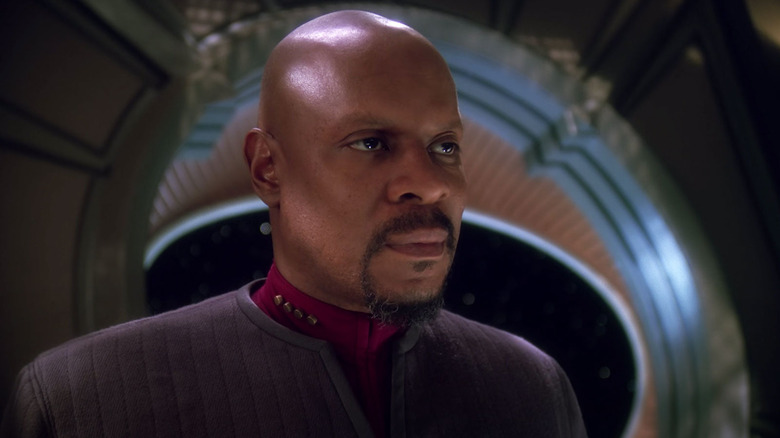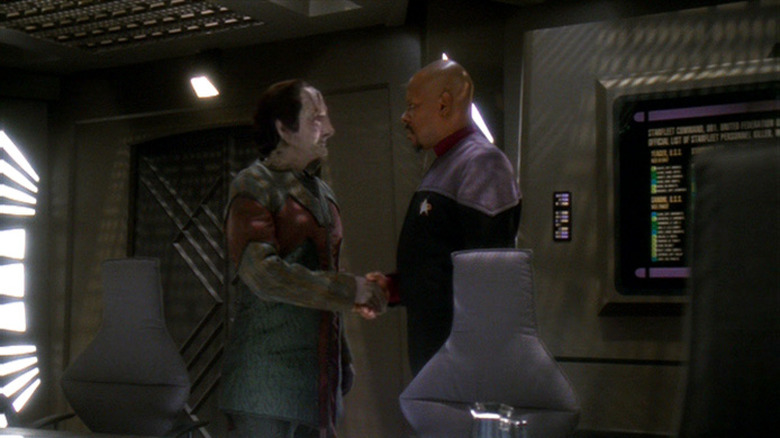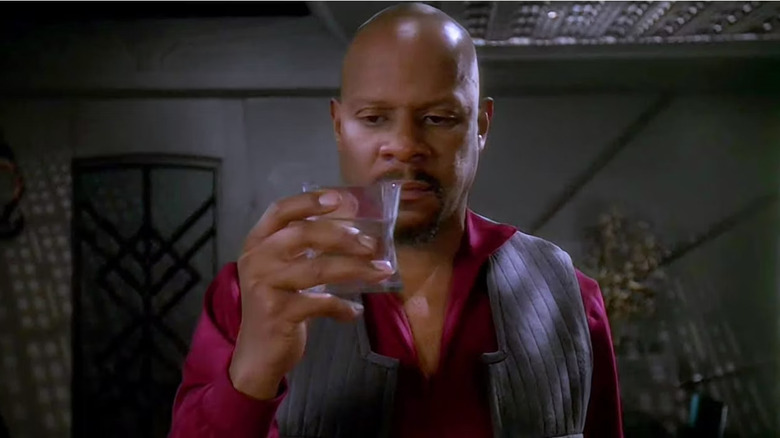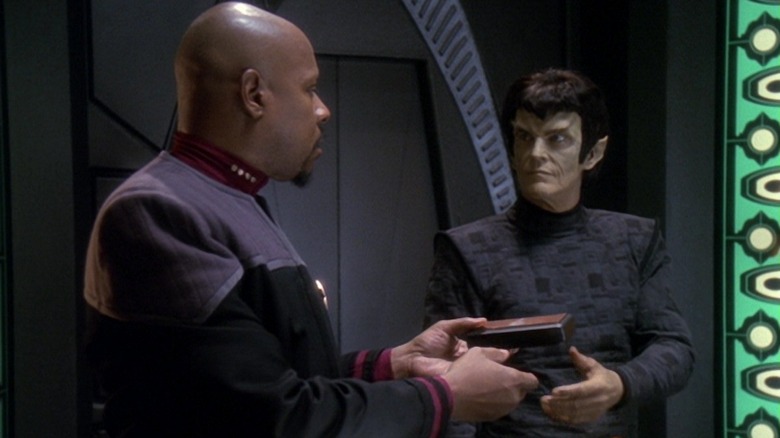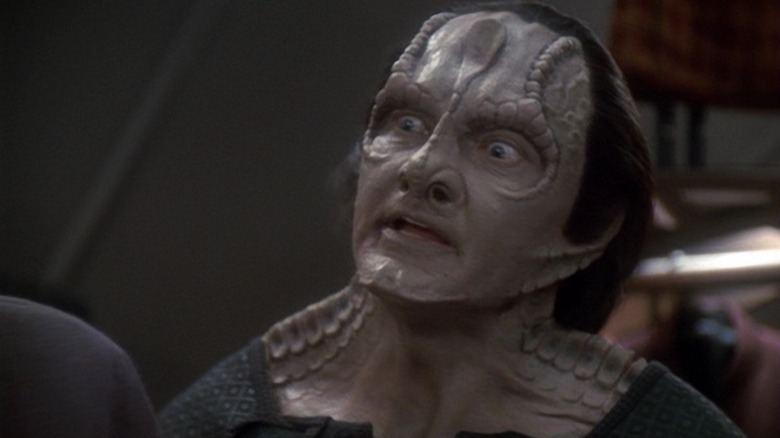How In The Pale Moonlight Proves That Sisko Is The Best Star Trek Captain
Everyone has their favorite "Star Trek" captain. Each has their own unique skills and flaws, and each comes with their own series and crew. Many argue for James Tiberius Kirk, originally portrayed by William Shatner in the original series, because he was the blueprint for all "Trek" captains who followed. Others are steadfast for Jean-Luc Picard (Patrick Stewart), who led the Enterprise on "Star Trek: The Next Generation," because he is an excellent explorer, diplomat, and ship's captain.
However, no "Star Trek" captain has faced the same incredible trials as Captain Benjamin Sisko (Avery Brooks), who commands the titular space station on "Star Trek: Deep Space Nine." Every other captain, from Captain Jonathan Archer (Scott Bakula) on "Star Trek: Enterprise" all the way through to Captain Michael Burnham (Sonequa Martin-Green) on "Star Trek: Discovery," is on board a traveling ship, and while they have different missions, they're all capable of warp speeding away from at least some of their problems. Deep Space Nine, by contrast, is a pivotal outpost near both the planet Bajor, recently freed from Cardassian rule, and a newly discovered wormhole that connects them to the Gamma Quadrant (which is ruled by the fascistic, colonizing Dominion, who have decided to invade).
The season 6 episode "In the Pale Moonlight," set deep during the Dominion War, shows Captain Sisko at his most desperate and willing to fight dirty, and it also shows why he is the greatest "Star Trek" captain of them all. The episode is somewhat controversial because it shows a Starfleet officer doing some very non-Starfleet-like behavior and it basically had to be snuck past busy executives. Nevertheless, it's one of the best in the entire franchise exactly because it finally deals with morality in shades of gray.
Conspiring with some shady characters
Deep Space Nine (DS9) had one other major difference from ships like the Enterprise or Voyager — it wasn't 100% run by the Federation. In order to keep things peaceful with the new temporary Bajoran government, DS9's first officer is from their military and there are a number of Bajorans on board. There are plenty of civilians too, including the Cardassian tailor/spy Garak (Andrew Robinson) and Ferengi bartender Quark (Armin Shimerman).
While Sisko is usually at odds with these two ne'er-do-wells, he is forced to work with them on their level during the events of "In the Pale Moonlight." In fact, when he feels pushed to act after the Dominion invade the peaceful planet Betazed (seriously, it's an entire planet of horny psychic hippies), he enlists Garak to help him find a forger so he can convince the Romulans to abandon their non-aggression pact with the Dominion, which would turn the tide of the war. It's a move that's impossible to imagine any other "Star Trek" captain making, in part because it's impossible to imagine any other captain even really knowing someone as unscrupulous as Garak.
Garak and Sisko free forger Tolar (Howard Shangraw) from a Klingon prison and he ends up attacking Quark while drunk. In order to keep Quark from pressing charges and having Tolar appear on official records, Sisko bribes him. Quark is thrilled because it proves the 98th Rule of Acquisition: "Every man has his price."
A complex captain for a complex Star Trek
What Quark doesn't fully understand is that the price of bribing him is a lot more than the bars of latinum and help with import papers that he asked for. It's the first of many moments where the captain realizes that he is abandoning certain ideals and tarnishing his own morality in the name of the greater good. It's also the first dent in his self-respect. In the episode, Sisko addresses the audience directly as he records a personal log to the computer in an attempt to absolve himself of his actions, all the while drinking and stripping down out of his Starfleet uniform as he does. There's something about revealing a character's personal logs that feels almost invasive, yet Sisko's fourth-wall-breaking direct address instead lets him be vulnerable and in command at the same time.
Despite being a half-celestial god creature (it's a long story), he's somehow the most human of all of the "Star Trek" captains. He's passionate, he's angry, and he can be a bit of a dick sometimes. Perhaps his closest competitor is Captain Shaw (Todd Stashwick) from "Star Trek: Picard," who also happened to be at the absolutely horrific Battle of Wolf 359 and has a similarly gruff exterior, but he didn't get quite as much time to show audiences the full breadth of his humanity. Sisko may be flawed, but he's also a brilliant tactician who understands that sometimes the truly moral choices are the most difficult ones.
The real cost of freedom
While the writers took a couple of seasons to really find their groove with Sisko (and, initially, showrunner Ira Steven Behr thought he was "a tragic mistake"), by season 6, he had become a truly compelling character whose writing matched Brooks' commanding screen presence. As Sisko recounts his version of events, he grows furious with his past self, saying, "People are dying out there every day! Entire worlds are struggling for their freedom, and here I am still worrying about the finer points of morality!" He realized that while he hemmed and hawed about some of the immoral things he had to do in order to force the Romulans to join their cause, numerous lives would be lost. Garak even tells him that his actions could change the fate of the entire quadrant, verbalizing just how high the stakes have become.
In the end, the Romulan emissary (Stephen McHattie) realizes that the forged data rod is, in fact, a fake, but his ship explodes before he can get anywhere with it. Garak sabotaged the ship and made it look like the Dominion did it, knowing that any discrepancies on the rod would just be attributed to damage from the explosion. He also kills Tolar, because loose ends cause problems. Sisko is furious and even punches him, but Garak explains that billions of lives were just saved, and the only sacrifices were "one senator, one criminal, and the self-respect of one Starfleet officer."
Garak has a point
Garak is no arbiter of morality, but he does have a point when it comes to the incredible victory that came at such a relatively small cost. It's not the kind of thinking that ever really appears in "Star Trek" because of creator Gene Roddenberry's idealism and the rules set in place by his successor, Rick Berman, but thankfully "Deep Space Nine" often allowed itself to get into the murkier, scarier side of science-fiction. It dealt with the difficulties faced during wartime and seemed to understand that often those embroiled in war didn't choose to be there. Sisko did not choose his unusual birth or place in the Bajoran faith, just as he didn't choose to end up being in charge of the outpost closest to a new invading force. But he's doing the best he can to minimize bloodshed and end the fighting, even when that means damning himself in the process.
Sisko is forced between a rock and a hard place at almost every turn, operating as an effective military leader while also taking care of all of the people aboard his space station, Federation, Bajoran militia, and civilian alike. It's difficult to imagine the space-faring explorers on their various ships even having the idea to plant evidence and force the Romulan's hands in the first place. And those who might, like Captain Pike (Anson Mount) of "Star Trek: Strange New Worlds," certainly wouldn't go through with it. But as Sisko tells us all (and the computer right before deleting the entire log), "I can live with it." He's made of stronger stuff than any of us, and he's the greatest Starfleet captain to have ever lived.
